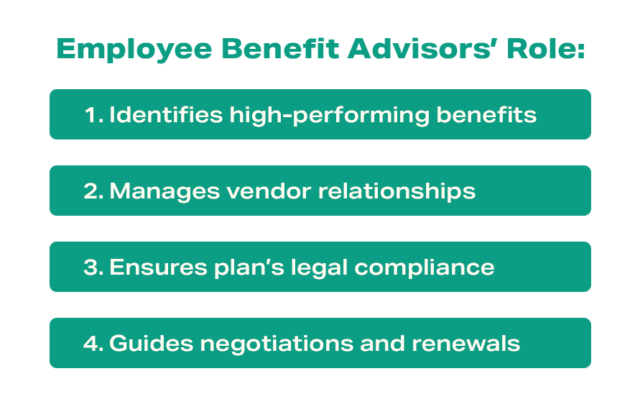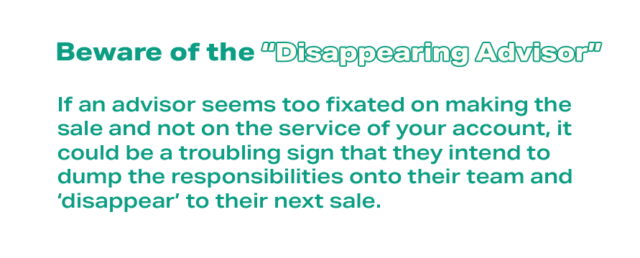An employee benefits advising firm is a service agency that advises human resources (HR) professionals, financial decision makers, and executives through the design, administration, and management of a total compensation program.
A benefit advisor’s primary role is to educate your organization’s stakeholders and HR professionals on the range of benefits available—including medical plans, dental plans, vision plans, life insurance, disability insurance, and other ancillary coverages.
What Services Does an Employee Benefits Advising Firm Provide?
Though the service experience of an employee benefits advising firm will vary based on their unique experience, pricing, etc. — you can typically expect these ‘core services’ from any advisor:
Identifies High-Performing Benefits – An employee benefits advisor will design plans (health insurance, pharmacy strategies, other perks) that strike a balance between minimal disruption, performance, and cost-optimization – creating harmony between HR and CFOs.
Manages Vendor Relationships – An employee benefits advisor should manage relationships with carriers and other vendors to ensure that plans are meeting the needs of the employees, rates/increase remain stable, and contract language is written to favor the employer.
Ensures Plan Compliance – An employee benefits advisor should research and provide regular updates on market conditions, industry trends, and changing laws/regulations to ensure your plans are up-to-date and compliant.
Guides Negotiations & Renewals – An employee benefits advisor can assist with the negotiations, paperwork, and other contract nuances that inevitably slow down strategic planning and plan renewal season.

How will an Employee Benefits Advisor Support Human Resources (HR) Teams?
The significant advantage of partnering with an employee benefits advising firm is that your HR team is empowered to focus on strategic/valuable initiatives. As opposed to spending their time managing day-to-day benefits administration. Additionally, you should consider an experienced advisor a wealth-of-information to consult with on other human resource best practices, including:
Recruiting – An employee benefits advisor will make recruiting efforts easier by designing an attractive total compensation package based on an organization’s specified employee attraction and retention goals.
Improving Employee Engagement – An employee benefits advisor can help you plan and implement employee engagement initiatives, such as wellness programs.
On/Offboarding – An employee benefits advisor can provide required plan information to new hires and assist with the exit process for departing employees — minimizing potential disruption to the organization.
What is a Typical Employee Benefits Advising Firm’s Support Structure?
Your account should be led by an experienced benefits advisor — who will guide high-level strategic planning, renewal negotiations and the decision-making process. Depending on the size/scope of the firm (and your organization), you can typically expect additional support from the following team members:
Account Manager – Serves as your main point of contact for ongoing plan administration, service issues, implementation, employee communication(s), and open enrollment.
Financial Analyst – Conducts financial and funding analysis, renewal negotiations and request for proposal activities. Additionally, analysts will monitor your plan’s performance and provides actionable reports throughout the year.
Population Health/Wellness Strategist – Designs health/wellbeing programs that engage your organization’s employees and empowers them to live healthier lifestyles.
Pharmacist/Pharmacy Expert – Evaluates pharmacy benefit contracts, terms, and conditions at the plan level to maximize pharmacy spend.
Beware of the Disappearing Salesperson Advisor
If an advisor seems too fixated on making the sale and not on the service of your account, it could be a troubling sign that they will dump their responsibilities onto their team and ‘disappear’ to their next sale. Remember, an advisor “selling” their services should be your main point of contact beyond the sales process – making themselves available throughout the life of your contract.
Selecting the Right Employee Benefits Consultant for your Organization
There are three key differentiators to consider when deciding which employee benefits consultant is the right fit for your organization.
Size – Whether you’re a small, mid-size, or a large employer, you should seek out an employee benefits advising firm that has a large book of business (and strong relationships) with the top insurance carriers in your market. Substantial buying power and strong carrier relationships give an advisor more leverage to negotiate better plan outcomes on your behalf.
Relevant Experience: Review an employee benefit advising firm’s client list to see if they work with similar organizations to yours. Their website should feature client testimonials of various industries, sizes, and plan types you can use to gauge the depth/breadth of their experience.
Stability: The best indicators of an employee benefit advising firm’s future stability are their employee and client retention metrics. A high employee retention rate means an advisory’s internal team is stable, and a good indication that the deliverables and expectations will be consistent. A high client retention rate (popularly measured by the Net Promotor Score) is a great sign that an advisory’s current clients are satisfied with their benefits, year-over-year.




